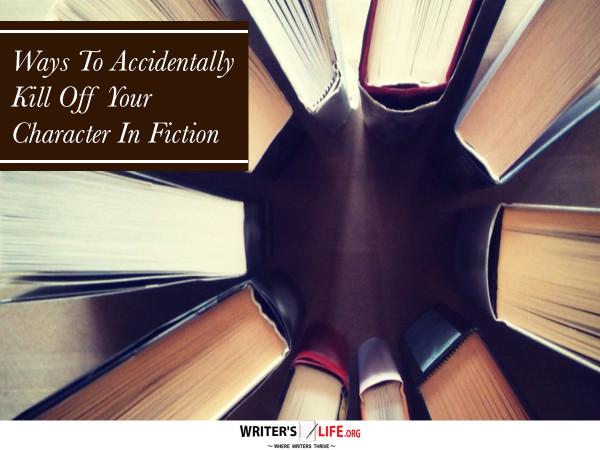- How To Tackle Jealousy In Creative Writing
- Common Submission Mistakes
- How To Stop Your Blog Becoming Boring
- The One Thing Every Successful Writer Has In Common
- How To Make Yourself Aware Of Publishing Scams
- Why Almost ALL Writers Make These Grammar Mistakes At Some Point
- 5 Tips For Authors On How To Deal With Rejection
- Top Mistakes to Avoid When Writing a Novel
- How to Avoid Common New Writer Mistakes
- 10 Mistakes New Fiction Writers Make
Ways to Accidentally Kill Off Your Characters in Fiction

Share, Pin or Retweet If You Love Writing!
When you’re writing a character, it’s important to know why she is the way she is. Knowing her backstory is important to achieving this end, and one of the most impactful pieces of a character’s backstory is her emotional wound. This negative experience from the past is so intense that a character will go to great lengths to avoid experiencing that kind of pain and negative emotion again. As a result, certain behaviors, beliefs, and character traits will emerge.
Characters, like real people, are unique, and will respond to wounding events differently. The vast array of possible emotional wounds combined with each character’s personality gives you many options in terms of how your character will turn out. With the right amount of exploration, you should be able to come up with a character whose past appropriately affects her present, resulting in a realistic character that will ring true with readers. Understanding what wounds a protagonist bears will also help you plot out her arc, creating a compelling journey of change that will satisfy readers.
Trapped in a pattern where you cannot get that novel finished? Then perhaps you need to check into the Get It Done Writer's Toolkit (click here!) that helps you make sure you get your project done on schedule and in an inspired, money-making way! This ebook/audio CD combo set teaches you how to overcome writer's block and procrastination and also helps you find more time and the inspiration to write every day.
Accidentally Killing Someone
NOTE: We realize that sometimes a wound we profile may have personal meaning, stirring up the past for some of our readers. It is not our intent to create emotional turmoil. Please know that we research each wounding topic carefully to treat it with the utmost respect.
Examples:
- a car accident (either a passenger in the car or a pedestrian or cyclist one hits)
- triggering an allergy (unknowingly serving food to someone highly allergic to it)
- a poisoning (a child consuming a fatal dose of medication while in one’s care)
- a drowning (a child drowning in one’s pool or bath tub, for example)
- killing someone while impaired
- instigating a prank and it goes wrong
- a fire (failing to put out a campfire leading to a blaze with fatalities, etc.)
- a boating or jet ski accident (running over a swimmer)
- peer pressure (pushing a friend to drink who later dies of alcohol poisoning)
- a freak accident (a fall or fatal injury) on one’s property
- a firearm or weapon accident (mishandling of a weapon, a hunting misfire, etc.)
- home protection accidents (shooting a family member in the dark believing they are an intruder)
- poor home maintenance (stairs collapsing, falling through a rotten floor, etc.)
- dares (e.g., to play chicken while driving) which leads to someone’s death
- hitting someone too hard in a fight
- selling a friend a bad batch of drugs
- a sport-related accident (a slap-shot hitting someone in the head, etc.)
- malfunctioning equipment (one’s tanning booth that electrocutes a client, etc.)
- horse-play between kids (play fighting which leads to a friend falling down the stairs, etc.)
- killing a bystander in the line of duty (in a police shoot out, for example)
- bumping a friend who then falls off a high story balcony or ledge
Basic Needs Often Compromised By This Wound: safety and security, love and belonging, esteem and recognition, self-actualization
False Beliefs That May Be Embraced As a Result of This Wound:
- It should have been me
- I am a terrible and worthless person
- I do not deserve to be happy or safe
- I do not deserve a child of my own and when I took another’s child away
- I do not deserve to be loved
- I am only capable of hurting people
- I cannot be trusted with responsibility of any kind
- People will hate me if they know what I did
- I should suffer for the pain I caused
- I can never fix what I did no matter how hard I try
- It would be better for everyone if I was dead too
Positive Attributes That May Result: alert, appreciative, cautious, cooperative, disciplined, empathetic, focused, generous, gentle, honest, honorable, humble, independent, inspirational, kind, loyal, mature, merciful, nurturing, obedient, passionate, private, protective, responsible, simple, spiritual, unselfish
Negative Traits That May Result: addictive, apathetic, cowardly, defensive, disorganized, fanatical, humorless, impulsive, indecisive, inhibited, insecure, irresponsible, martyr, morbid, obsessive, oversensitive, reckless, self-destructive, subservient, timid, uncommunicative, withdrawn, workaholic, worrywart
Resulting Fears:
- fear of making another mistake that costs someone their life
- fear of responsibility or being in charge (making decisions that impact others)
- fear of losing control (if irresponsible behavior led to the death)
- fears regarding being safe enough (if disrepair or a lack of safety protocol was involved)
Possible Habits That May Emerge:
- paranoia or obsession regarding the circumstances that led to the death: installing safety railings everywhere (a fall), not letting children be alone even for a moment (a drowning on one’s property), refusing to drive if the weather looks even a bit poor (car accidents)
- over-preparing: going to great lengths to research a situation so one does not make a mistake, keeping emergency kits on hand everywhere, etc.
- avoiding positions of power and responsibility so one does not have a chance to screw things up or fail people again
- withdrawing, avoiding friends, family or the public eye
- not chasing one’s dreams because one believes one does not deserve to have them
- giving up things that one loves for self-punishment
- taking risks because one no longer believes one has value
- taking risks in hopes death will occur, to atone for one’s mistake
- drinking or drug abuse to cope
- blaming others for what happened rather than accept one’s role
- avoiding situations and people tied to the event
When you are ready to self-publish your first novel, you might be interested in "How to Get Published, Sell Books & Attract Tens of Thousands of Readers by Selling Your Content on Amazon’s Kindle” (CLICK HERE), which is a webinar that we put together that teaches writers how to publish to Amazon's Kindle Directory and also market, promote and sell their work.



























